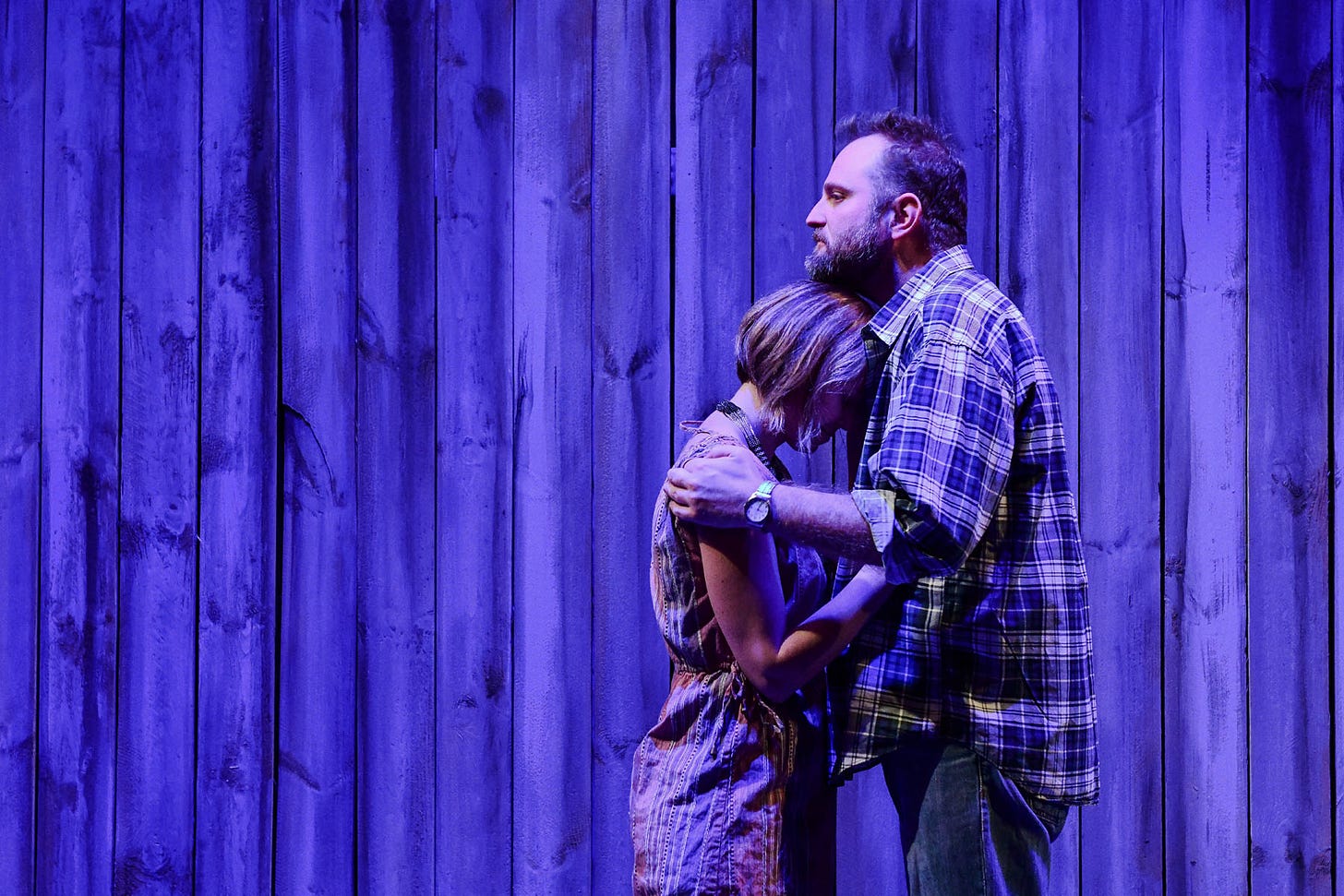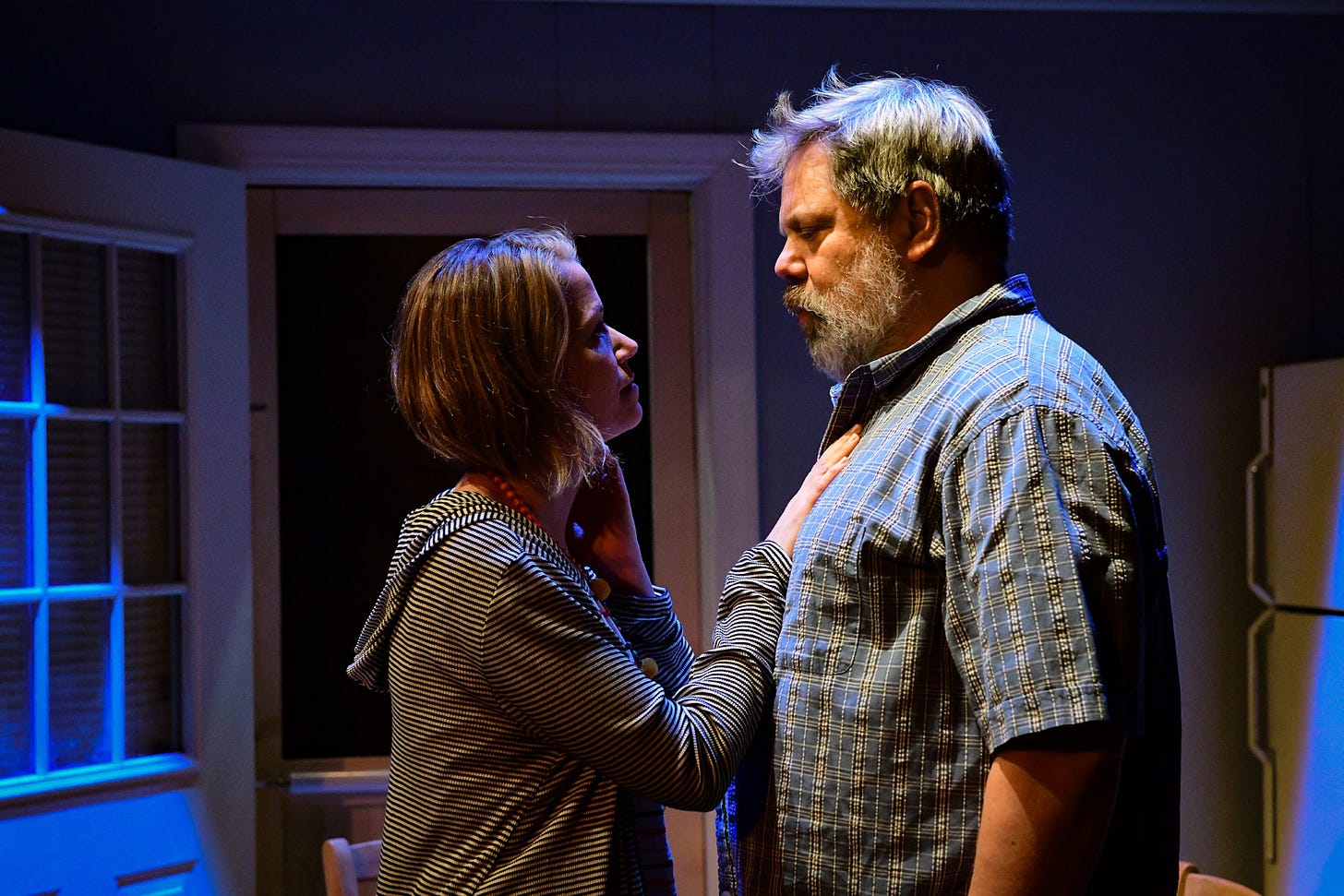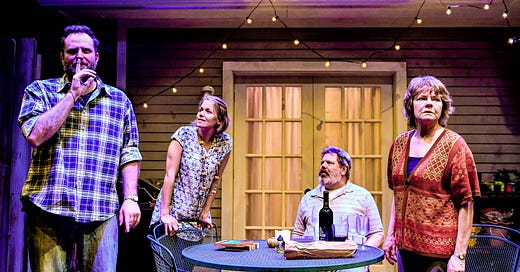You’re reading an exclusive review for paying subscribers to Storefront Rebellion, a new endeavor in Chicago theater reviewing from longtime critic Kris Vire. Have feedback for me? Reply to this email or find me on Twitter at @krisvire.
You’ll want to keep up with Jeremy Wechsler’s warm, thoughtful staging of Will Eno’s most grounded work yet
Theater review by Kris Vire

From left: Joseph Wiens, Cortney McKenna, H.B. Ward, Linda Reiter
No matter the plot details, Will Eno’s plays tend to be concerned on some basic level with the insufficiency of language. Whether it’s the existentially panicking local TV news reporters of Tragedy: A Tragedy, the possibly alien visitor of Title and Deed or the interconnected denizens of Middletown, Eno’s characters always seem to be struggling for the words they need to connect, words that may not have been invented yet.
That quality is certainly on display in The Realistic Joneses, making an overdue Chicago premiere in a co-production by Shattered Globe Theatre and Theater Wit, with direction by a close Eno collaborator, Wit’s Jeremy Wechsler. In Joneses, in fact, it’s explicit: We learn early on that one of the four characters, Bob (played here by the criminally underappreciated H.B. Ward) is being treated for a degenerative disease, which among its symptoms affects the language centers in the brain.

Cortney McKenna and Joseph Wiens
Yet it’s metaphorical, too; Bob would prefer to ignore his condition as much as possible—a source of friction between him and his frightened and frustrated wife, Jennifer (Linda Reiter), who tells their new young neighbors, John (Joseph Wiens) and Pony (Cortney McKenna), “Bob doesn’t like talking about it… In fact, we kind of distinctly never do.”
The two couples share a surname, which gives the play its title, but it’s up for debate which of them is the more realistic. John and Pony seem to be on the run from dealing with something, though it isn’t clear at first what, or if both of them are even fully aware of it.

Joseph Wiens and Linda Reiter
Their last name isn’t the only thing they share with Bob and Jennifer, we eventually see, and by the play’s end they’ll have shared much more, across a series of sweet, sad, and funny encounters spanning the course of a few months. Wechsler’s cast is on point, hitting Eno’s unique rhythms not too hard and mining the real emotion that lies beneath. (One small complaint: Jack Magaw’s scenic design, though lovely, makes for slow scene transitions that hinder the pace of a script that wants to keep moving.)
Eno has always been a humanist, but for all the wordplay and non sequiturs, this might be his most grounded work, a portrait of marriages under all too real strain. There are absurdities the Joneses have to deal with, but only the kind you find in life.
The Realistic Joneses
Shattered Globe Theatre and Theater Wit (1229 W Belmont Ave). By Will Eno. Directed by Jeremy Wechsler.
Cast: Cortney McKenna, Linda Reiter, HB Ward, Joseph Wiens.
Designers: Jack Magaw (scenic), John Kelly (lighting), Hailey Rokowiecki (costumes), Christopher Kriz (sound/original music), Vivian Knouse (props).
Running time: 1 hour 45 minutes; no intermission. Through March 9. Tickets ($24–$74) at theaterwit.org.
Photographs by Evan Hanover.
Storefront Rebellion Interview: Will Eno, part 2
And now, as promised, the second part of my interview with Will Eno. (Read part 1 here.) Our conversation took place before the announcement of the thing-that-really-happened Skittles Commercial: The Broadway Musical, or else you know I would have had several questions about that.
This interview has been edited and condensed.
Kris Vire: I know that you came to playwriting sort of late and without the kind of formal training that’s become so common these days. So I’m curious to know what your relationship was with theater before you started writing for it. Did you grow up as a theatergoer?
Will Eno: I really did not. I remember having a sort of semi-mystical experience with that musical, 1776. It was in Vermont, at a small kind of summertime thing, and we all went to see that. And it was just something simple—I think it was a chair was supposed to be magically pulled off the stage by a, whatchamacallit, a little piece of fishing line or something like that? And it started off its journey and then it just hit a crack, or a floorboard at a different height, so it sort of stopped and then it sort of just sat there jiggling for a little bit. And then I think somebody ran out to lift it over the thing or just grab it altogether.
I don't think I was fully gripped by that play, but I was just amazed at that moment, of the sort of absolute present. The, on the one hand, totally on-the-ground mechanicalness of it, and then the weird mystery of it. Because I had no context to figure out, was it that this is just the part where the chair quivers now? I didn't know what we were meant to take from it.
So that was one experience. And then reading a very, very short Don DeLillo play 15 or 20 years later was my second very memorable experience with theater, and it was just me reading a play. And then starting to read Shakespeare in my late 20s, and being amazed at the words and the feelings and the thoughts, of course, but also just the elegance of, just, “Now deck out the stage with princes in your mind” and all that, however that stuff goes. I went out with a girl in high school who was in South Pacific so I went to go see that. But I don’t have, not a big relationship with it prior to getting going.

From left: Cortney McKenna, Joseph Wiens, H.B. Ward and Linda Reiter in The Realistic Joneses
KV: I think critics and marketing departments both have a tendency to draw comparisons between you and a certain set of other writers. You know, it’s often mentioning Beckett or Thornton Wilder; I’ve been guilty of it myself—I remember mentioning Middletown was meant to be in conversation with Our Town, but I’ve seen you since say that that was not your conscious intention. So who are the other writers that you read as you were moving into thinking about writing for theater?
WE: Well see, you’re probably more right than I am on that thing because I just know I took conscious pains to… you know, for instance, there’s no more direct address in Middletown in the second act, and I was just trying to do things that did not repeat what I think are the incredible strengths of Our Town. And I guess just to say it in a way that’s less defensive and more charitable to Thornton Wilder, I think that play is so close to perfect. I thought David Cromer’s Our Town was so strong that it actually showed a tiny, tiny touch of maybe over-writing in the third act; maybe it was being able to smell bacon that made it so rich that it…. Anyway, I just think that play is so strong and so great. And I realize that what I’d like to say now is it pleases me greatly that there might be a meaningful conversation between those two plays.

Cortney McKenna and H.B. Ward in The Realistic Joneses
So definitely Thornton Wilder is a guy I’ve read and gotten great energy from and excitement from, and Beckett when I was much, much, much younger. Just with Beckett, I just think he didn’t really have a play that was in that first-person direct address, the, “Hi ladies and gentlemen, welcome to theater.” Which I find really exciting, and I hope there’s something profitable in beginning something in that way or beginning in that realm.
KV: Just sort of the acknowledgement of the occasion, right?
WE: Yeah, in a plain and as real a way as you can I think. But to your question: definitely, definitely DeLillo and Shakespeare. I’m sure everyone has gotten a lot of Howard Barker, just for the intensity and the energy of it, and the bluntness of the syllables and in combination with the bluntness of the meaning. There’s a guy who sometimes gets called the Sam Shepard of Canada? And he’s written a bunch of plays?
KV: Oh yeah, I believe I know who you’re talking about, I have one of his books on my shelf here actually. Is it George F. Walker?
WE: That is who it is yes.
KV: Yeah.
WE: I saw a play of his that my cousin was in up at Yale Rep, and it just had this amazing thing with a kind of rogue cop had caused incredible and sustained pain in someone else’s life, you know something that took 15 years to really come to its full painful fruition. But that guy who caused it all, he bumps into this other guy, and the line was, “How’s your agony?” Which I always thought was just an amazing thing. There’s a lot of plays that I’ve seen and I couldn’t quote you any line, but I do remember, “How’s your agony?”

Linda Kimbrough and Dan Waller in Gnit at the 37th Humana Festival of New American Plays. Photograph: Alan Simons
KV: The one play of yours—so far—that I think you can say definitively is in conversation with another writer’s work is Gnit [Eno’s very loose adaptation of Ibsen’s Peer Gynt], which I saw at the Humana Festival [in 2013] but has yet to be done in Chicago. Does that feel like a very different task to you? Taking sort of themes and plot from an existing work and shaping it to your sensibility?
WE: It does, it completely did. I worked on that for a lotta, lotta years and I read a ton of different translations and I tried to get a couple of people in Norway, I knew I tried to get to some literal almost translations but just as literal as people could make them of some different parts. So I really, really studied and worked and went slowly, and then at a certain point, years had gone by and I was just—there are things that I am slightly confused as to whether there’s any relation to the initial play or not. Eventually I would remember. But it finally became more or less like the regular process of writing a play, where you’re just trying to get the feelings and thoughts in as meaningful and as powerful an order as they could go.
KV: There’s a point at which you’ve sort of taken all you can from Ibsen, and you just have to forge your own path from there?
WE: Yeah. And I actually did a reading [recently], with Michael C. Hall reading Peter and Tyne Daly was his mom, and Ari Graynor and Peter Francis James, Matthew Mayer, at the Theater for a New Audience in New York. And I’ve actually done some writing since the advent of our president, and I think it’s a play that really questions some things that have gotten us to Trump rather than just questioning Trump. I hope it’s in a way that the play could be done in a really, really red state and start a conversation that does not just immediately derail into partisanship. So I hope we’re sort of lurching toward a New York production, and I hope it happens in Chicago too.
KV: What else can you tell me about what’s next for you?
WE: Let’s see. Oh, you might be mildly amused by this. I have a play called The Underlying Chris. C-H-R-I-S, but also there is a character K-R-I-S in the play. I’m doing a reading and working on that… that’s happening with Second Stage Theater in New York and also the Center Theatre Group in Los Angeles. It’s a co-commission sort of thing. So I’m excited about that, and then I did another adaptation of a play that I did not know before I found it and got so excited about it—The Verge, by Susan Glaspell. She was a feminist from about a hundred years ago and she wrote this really, really great and crazy play that I think does not need my help except that there’s some slightly clunky—just the way that O’Neill can sound slightly clunky here and there.
KV: Sure.
WE: So I’ve had a fun time, actually working a little bit in conversation with Joy Meads, we had some good chats about that. I’m trying to find a home for that, and then also working on another new play. But I hope to have a new play somewhere or other in 2019.
Thanks for being an early Storefront Rebellion paid subscriber!
If someone forwarded you this email, and you’d like to support independent, ad-free coverage of Chicago theater, you can sign up as a subscriber right now:
Send your feedback and tips to kris@krisvire.com.



